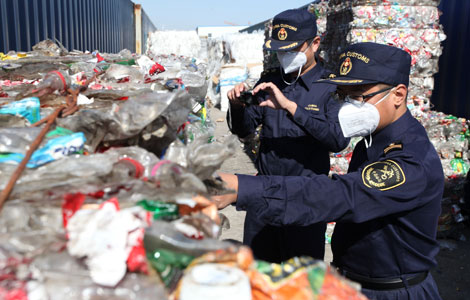China's top oil importer status 'overrated'
Updated: 2013-10-17 09:50
(Xinhua)
|
||||||||
BEIJING -- Media reports of China surpassing the United States as the world's biggest oil importer as shown by data from a US government agency were somewhat overrated, experts said.
Recently published data by the US Energy Information Administration (EIA) showed that net imports of the US and China stood at 6.24 million and 6.3 million barrels per day in September, respectively.
The EIA further forecast that China will start overtaking the US by October 2013 on a monthly basis and by 2014 on an annual basis in terms of net oil imports.
"China's net oil imports last month surpassing those in the US was due to seasonal factors to some extent, and do not represent a yearly tendency," said Wang Zhen, deputy director of the institute of Chinese energy strategy in China University of Petroleum.
According to the statistics of China's General Administration of Customs, net imports of crude oil in September stood at 25.6 million tons, while in the first nine months net imports reached 210 million tons.
That is compared to the 304 million tons of net oil imports by US in the first nine months, according to data published in the EIA's monthly energy review.
Given a gap of almost 100 million tons, Wang predicted that China will still not replace the US as the world's top oil importer this year.
In 2012, net imports of crude oil in the US was 425 million tons, almost 150 million tons more than China, according to the BP Statistical Review of World Energy.
Putting aside forecasts, analysts attributed September to relatively fast economic growth, a healthy domestic auto market, rapid urbanization and growing personal income.
Economic growth in China eased to 7.5 percent in the second quarter. A slowdown for the third straight quarter, it was still better than the 2.5 percent achieved by the United States. China's auto sales up to September of 2013 totaled almost 16 million units, up 12.7 percent year on year, and surpassed the US as the world's top auto market as early as 2009.
Niu Li, an expert with the State Information Center, said petroleum consumption will grow relatively fast because of the changing energy consumption mix, industrialization and the consumption upgrade.
US dependence on oil imports has been decreasing in recent years and petroleum consumption has peaked. Technological breakthroughs in oil and gas exploration have greatly boosted domestic output.
In contrast, China's dependence on imported oil has been gradually growing to 57 percent at present from 32 percent at the beginning of the 21st century.
Based on this, Niu Li predicts that China will become the largest net oil importer in the future, without an exact estimate when this will happen.
Media reports at home and abroad have also focused on the challenge of energy security with increasing reliance on imports and continuing problems of air pollution.
Efforts are underway to expand energy exploration while reducing energy consumption and in setting both national and regional targets for pollution control and carbon emission reductions.
Global activities by Chinese petrol and gas companies over the past 20 years have pushed up output in the Middle East, Central Asia, Africa, and South America. Some of the output was traded globally. This kind of cooperation had boosted employment and growth in other countries.
Chinese oil enterprises targeted areas with harsh environments for exploitation where western counterparts were not willing to establish businesses.
Der Spiegel said in an article published on Oct 12 that China, as the biggest customer of major oil producers such as Iran and Saudi Arabia, is becoming an important political force in these countries.
"China has been preserving regional stability to fulfill its global responsibility in accordance with the country's economic strength," said Hua Liming, the former Chinese ambassador to Iran. Hua noted that China has always held a responsible attitude and adhered to mutual benefits in its energy cooperation with other countries.
Energy supply security and energy demand security are mutually dependent and balanced, which requires coordination among nations rich in resources, importing nations, and oil companies.
Most Viewed
Editor's Picks

|

|

|

|

|

|
Today's Top News
US debt impasse ending, Obama to sign bill
Facebook goes fishing in China
Michigan auto czar leading trade trip to China
Yuan gains the most in 20 years
Tibet avalanche claims 4
First interprovince subway route opens
US expert finds job 'rewarding'
Trending news across China
US Weekly

|

|















